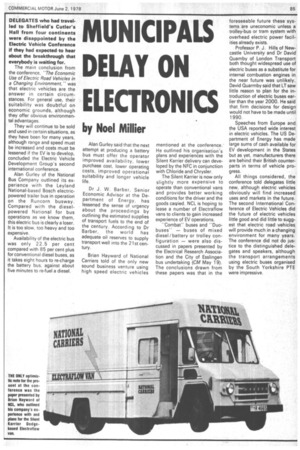MUNICIPALS DELAY ON ELECTRONICS
Page 87

If you've noticed an error in this article please click here to report it so we can fix it.
by Noel Millier
DELEGATES who had travelled to Sheffield's Cutler's Hall from four continents were disappointed by the Electric Vehicle Conference if they had expected-to hear about the breakthrough that everybody is waiting for.
The main conclusion from the conference, "The Economic Use of Electric Road Vehicles in a Changing Environment," was that electric vehicles are the answer in certain circumstances. For general use, their suitability was doubtful on economic grounds, although they offer obvious environmental advantages.
They will continue to be sold and used in certain situations, as they have been for many years, although range and speed must be increased and costs must be lessened if the EV is to develop, concluded the Electric Vehicle Development Group's second international conference.
Alan Gurley of the National Bus Company outlined its experience with the Leyland National-based Bosch electricpowered trailer bus in operation on the Runcorn busway. Compared with the dieselpowered National for bus operations as we know them, this electric bus is clearly a loser. It is too slow,, too heavy and too expensive.
Availability of the electric bus was only 22.5 per cent compared with 85 per cent plus for conventional diesel buses, as it takes eight hours to re-charge the battery bus, against about five minutes to re-fuel a diesel. Alan Gurley said that the next attempt at producing a battery bus must offer the operator improved availability, lower purchase cost, lower operating costs, improved operational suitability and longer vehicle life.
Dr J. W. Barber, Senior Economic Advisor at the Department of Energy, has lessened the sense of urgency about the proceedings by outlining the estimated supplies of transport fuels to the end of the century. According to Dr Barber, the world has adequate oil reserves to supply transport well into the 21st century.
Brian Hayward of National Carriers told of the only new sound business venture using high speed electric vehicles
mentioned at the conference: He outlined his organisation's plans and experiences with the Silent Karrier delivery can developed by the NFC in conjunction with Chloride and Chrysler.
The Silent Karrier is now only slightly more expensive to operate than conventional vans and provides better working conditions for the driver and the goods carried. NCL is hoping to lease a number of Electraflow vans to clients to gain increased experience of EV operations.
"Combat" buses and "Duobuses" — buses of mixed diesel /battery or trolley configuration — were also discussed in papers presented by the Electrical Research Association and the City of Esslingen bus undertaking (CM May 19). The conclusions drawn from these papers was that in the foreseeable future these systems are uneconomic unless a trolley-bus or tram system with overhead electric power facilities already exists.
Professor P. J. Hills of Newcastle University and Dr David Quamby of London Transport both thought widespread use of electric buses as a substitute for internal combustion engines in the near future was unlikely. David Quarrnby said that LT saw little reason to plan for the introduction of electric buses earlier than the year 2000. He said that firm decisions for design would not have to be made until. 1990.
Speeches from Europe and the USA reported wide interest in electric vehicles. The US Department of Energy has made large sums of cash available for EV development in the States but as yet, manufacturers there are behind their British counterparts in terms of vehicle progress.
All things considered, the conference told delegates little new, although electric vehicles obviously will find increased uses and markets in the future. The second International Conference of Electric Vehicles did the future of electric vehicles little good and did little to suggest that electric road vehicles will provide much in a changing environment for many years. The conference did not do justice to the distinguished delegates and speakers, although the transport arrangements using electric buses organised by the South Yorkshire PTE were impressive.








































































































































